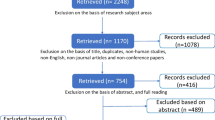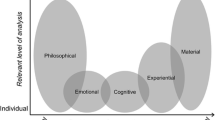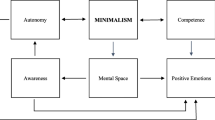Abstract
Happiness is recognised as a prime driver of development but studies have shown that there is no universal definition of the term which is moulded by its cultural context. In India, the Sanskrit word sukha is often used to denote happiness. This conceptual paper is an interpretative analysis of the word which literally means ‘excellent space’. Basing itself on the premise that human life is comprised of several concomitant spaces, it explores the relationship between the feeling of happiness and the quality of the different dynamic internal and external spaces that form an intimate part of an individual’s existence using the analogy of the spaces within a house. It further establishes that while happiness is determined by the nature of the internal space, it is significantly affected by her external circumstances due to the symbiotic nature of these spaces. It, therefore, briefly looks at the implications of sukha in connection with development and introduces the idea of self-architecture as a psychological process by which a person takes responsibility for designing, structuring and managing the different spaces in her life. Finally, this paper proposes the following 1) to examine the various dimensions of the term sukha, with respect to some prevailing notions of happiness 2) to explore happiness in terms of quality of spaces 3) to see its implications on development and thereby hinting at the possibility of evolving a measurement tool based on sukha or ‘excellence’ as a benchmark for a nation’s progress.
Similar content being viewed by others
Notes
The adjective ‘excellent’ henceforth will be used to represent all the other qualities mentioned in the definition of the term.
Conducted by the authors at the Centre for Indian Psychology, Jain University, Bangalore, in April 2014
http://www.swami-krishnananda.org/chhand/ch_3e.html viewed on 20.4.2013
sarve bhavantu sukhinaḥ,
sarve santu nirāmayāḥ,
sarve bhadrāṇi paśyantu,
mā kaścid duḥkhabhāg bhavet.
Om śāntiḥ śāntiḥ śāntiḥ
References
Andrews, F.M, & Withey, S.B. (1976). Social indicators of well-being. New York: Plenum.
Argyle, M. (1987). The psychology of happiness. London: Meuthuen.
Aristotle (1999). Nicomachean ethics. Kitchener: Batoche Books.
Aurobindo, S. (1993). In A. Roy (Ed.), The Message of the Gita (5 ed.). Pondicherry: Sri Aurobindo Ashram.
Aurobindo, S. (1997). Essays on the Gita. Pondicherry: Sri Aurobindo Ashram Trust.
Banavathy, V. K., & Choudry, A. (2014). Understanding happiness: a vedantic perspective. Psychological Studies, 59(2), 141–152.
Biswas-Diener, R., Tay, L., & Diener, E. (2012). Happiness in India. In H. Selin, & G. Davey (Eds.), Happiness across cultures: views of happiness and quality of life in non-western cultures, 6, 13–25. Netherlands: Springer Netherlands.
Choudry, A. (2011). Psyche east and west: The problem of identity and strangeness. In K. Gallagher (Ed.), Multiculturalism: Critical and inter-disciplinary perspectives (pp. 11–18). Oxford, UK: Inter-Disiplinary Press. Retrieved from http://www.inter-disciplinary.net/publishing/id-press/.
Choudry, A., Banavathy, V. K., & Kanasu, S. S. (2013). Life and experiences of ramana maharshi: An illustration of the emperical basis of Indian psychology. In A. Choudry, & V. K. Banathy (Eds.), Perspectives on Indian psychology (pp. 126–143). Bangalore: Jain Univeersity Press.
Cornelissen, M. R. (2000). The integration of psychological knowlege from the spiritual traditions into the psychology curriculum. The Journal of Consciousness and Experiential Psychology, 4(1), 1–4.
Dambrun, M., & Ricard, M. (2011). Self-centeredness and selflessness: a theory of Self-based psychological functioning and its consequences for happiness. Review of General Psychology, 15, 138–157.
Diener, E. (1984). Subjective well-being. Psychological Bulletin, 95, 542–575.
Diener, E., & Suh, E.M. (eds). (2000). Cultural and Subjective Well-Being. Cambridge, MA: The MIT Press.
Ekman, P., Davidson, R. J., Ricard, M., & Wallace, A. B. (2005). Buddhist and psychological perspectives on emotions and well-being. Current Directions in Psychological Science, 59-63.
Frankl, V. E. (1992). Man’s search for meaning: An introduction to logotherapy (4 ed.). (I. Lasch, Trans.) Boston: Beacon Press. Retrieved February 12, 2014, from http://www.spiritual-minds.com/philosophy/assorted/(ebook)%20Viktor%20Frankl%20-%20Man’s%20Search%20For%20Meaning%20(psychology,%20psychotherapy,%20philosophy)-o.pdf.
Hornby, A.S., Gatenby, E.V., and Wakefield, H. (1948). The advanced learner's dictionary of current English. Oxford, UK: Oxford University Press.
Kitayama, S., & Markus, H.R. (2000). The pursuit of happiness and the realization of sympathy: Cultural patterns of self, social relations, and well-being. In E. Diener and E.M. Suh (eds), Cultural and Subjective Well-Being (pp. 113–161). Cambridge, MA: The MIT Press.
Krishnananda, S. (1984). The chhandogya Upanishad. Rishikesh: The Divine Life Society. Retrieved April 22, 2013, from http://www.swami-krishnananda.org/chhand/Chhandogya_Upanishad.pdf.
Kumar, S. K. (2003). An Indian conception of well being. (vi. (J. Henry, Ed.) European Positive Psychology Proceedings 2002. Retrieved from http://www.ipi.org.in/texts/kirankumar/kk-indian-conception-ofwellbeing.php.
Kumar, S. K. (2006). Happiness and well-being in Indian tradition. Psychological Studies, 51(2–3), 105–112.
Kuppuswamy, B. (1977). Dharma and society - A study in social values. Delhi, India: The Macmillan Co. of India Ltd.
Li, L. (1995). The relationship between subjective well-being and psychological variables in Taiwan. The Journal of Social Psychology 135, 351–357.
Lu, L. (2001). Understanding happiness: a look into the Chinese folk psychology. Journal of Happiness Studies, 2(4), 407-432.
Lu, L., & Gilmour, R. (2004). Culture and conceptions of happiness: individual oriented and social oriented SWB. Journal of Happiness Studies, 5 (3), 269–291.
Malhotra, R. (2011). Being different. India: Harper Collins Publishers.
Maslow, H. A. (1968). Towards a psychology of being. New York: Van Nostrand Reinhold Company.
Monier-Williams, M. (1956, 1960). A Sanskrit-English dictionary. London: Oxford University Press.
Ryff, C. D. (1989). Happiness is everything, or is it? Explorations on the meaning of psychological well-being. Journal of Personaily and Social Psychology, 57(6), 1069–1081.
Seligman, M. E. (2002). Authentic happiness: Using the new positive psychology to realise your potential for lasting fulfillment. New York: Free Press.
Tyagananda, S. (2008). No One is a Stranger. In V. Kesari, & V. Kesari (Ed.). Chennai: Sri Ramakrishna Math.
Uchida, Y., Norasakkunkit, V., & Kitayama, S. (2004). Cultural constructions of happiness: theory and emperical evidence. Journal of Happiness Studies, 5(3), 223-239.
Ura, K., Alkire, S., Zangmo, T., & Wangdi, K. (2012). A Short Guide to Gross National Happiness Index. Thimpu: The Centre for Bhutan Studies. Retrieved November 18, 2014, from Gross National Happiness: http://www.grossnationalhappiness.com/.
Author information
Authors and Affiliations
Corresponding author
Rights and permissions
About this article
Cite this article
Choudry, A., Vinayachandra, B.K. Understanding Happiness: the Concept of sukha as ‘Excellent Space’. Psychol Stud 60, 356–367 (2015). https://doi.org/10.1007/s12646-015-0319-5
Received:
Accepted:
Published:
Issue Date:
DOI: https://doi.org/10.1007/s12646-015-0319-5




